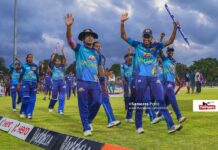ThePapare.com sat down in conversation with Sri Lanka’s long-serving IRB certified referee Dilroy Fernando as he hangs up his whistle after 22 years. He announced his retirement from refereeing with his final game having been on the 22nd of May 2013
Being a referee is difficult. It’s open for criticism but lot of people still decide to be one because they have a passion for the sport. Was it the same in your case?
Yes, couldn’t be more precise. I was the captain of the Isipathana Rugby team. I have even played for nationals but I had to leave the sport early on, in 1986, due to physical instability. Then I was part of the Isipathana rugby committee where I refereed junior school games in my leisure time. This wasn’t official and I just did without any prior training or knowledge. Mr. Kaluarachchi a referee back then encouraged me to be a professional referee and gave me the book called ‘The art of Refereeing’. It was the first approach and having this in mind, in 1990 I officially applied to become a referee and though I never got called, I was officially called to referee in 1991.
Any achievements down the refereeing life? As a referee, and a referee committee member
As a referee – the biggest turning point in my life was moving to Hong Kong. I underwent training there from 1993 – 1995. This gave me an insight into what refereeing really was. They gave me regular games and were watching my refereeing and training me. Also I’d like to note I was the only Asian referee, others were from New Zealand, South Africa and etc. Since then my biggest achievement was to referee a range of matches from Japan vs. Korea Asian gold medal finals to New Zealand vs. Fiji in commonwealth games to Hong Kong 7s to Run Touch games to India vs. Pakistan. In total I have refereed over 550 games.
As a committee member – I made many mandatory reforms. When I got the first appointment I did not get a traveling allowance, a jersey, boots or even a whistle. I had to buy on my own. But it was not supposed to be so. I brought to attention that refereeing should be given more priority and funds should be raised. I made necessary changes to bring up the standards of refereeing to a semi profession. I was selected for a referee training program in Dublin Ireland and since then I have conducted referee training programs in Hong Kong, Dubai, China, India, Pakistan, Iran and of course in Sri Lanka. Right now I am a referee committee member and a selector for Asia.
The two teams and the coaches are at a very stressful stage before the game; everybody wants to win. How do you handle this situation as a referee?
Yes, now more than ever. Since there is lot of money involved in games not only the coaches but the managers and officials badly want to win the game. Losing the game means losing their job at times. Being a coach for so long I realize how stressful it is. I try my level best to be upfront with my technicalities. I always have a word with the captain and the coach of both the teams before the game; I breakdown the rules and my methods. If anyone needs a clarification they can do so at that point. Even afterwards the captain can speak to me. If the other team members have a question they also can direct it through the captain. I usually build a mutual understanding with both the sides. This has helped me a lot.
How do you prepare before a match? Do you change the preparation according to the match you referee? Brief us on this a bit.
No, regardless of the match, whether it’s an international match or a local school match, my preparation is same. If the match takes place in Friday I practice on Monday, Tuesday and Wednesday and take a break on Thursday. If it’s a Saturday match then I take a break on Wednesday and practice on other days. Basically this is how I prepare myself for any match. Apart from that I visit the grounds about an hour before the match and get myself familiar with the location. If there are any shortcomings I always try sort stuff up with the help of the ground staff. That is the only difference I make in preparation according to the match if there are any.
Some consider refereeing as a negative business, because most of the time people remember the only misjudgment you commit. How do you deal with such instances?
Firstly you cannot make everyone happy. When one team wins the other loses but what we can do is be honest and impartial. At the end of the day nobody can be perfect so I will blow the whistle only if I see a fault. Same way a coach and a player makes mistakes a referee does too. Here what I do is if I make a mistake I accept it. But I try to minimize these and I find most of the time I am right. I always check the game video and see where I went wrong. If a coach wants to clarify anything I’ll invite him to join me.
What about the criticisms you get from the crowd? How do you handle that?
I always try to stay focused on the game and I don’t pay attention to what the crowd says. But it comes to certain points it’s very distractive. There are instances I’ve lost my control and beaten people in the audience; sometimes while the game is going on and sometimes once it’s over. It comes to a point you cannot tolerate because you have worked so hard in order to prepare and tried your best to get it as right as it is humanly possible. At times I hand over the whistle to the people who brag because if they are so confident why are they not refereeing already. All in all I try to ignore the comments because most of them have hardly any knowledge about the rules or the sport.
Once you are done with a game do you pay attention to the comments others make on your refereeing and prepare yourself?
Yes, I always try to minimize whatever the mistakes I made in the previous game. At the start of my career I used to carry a video camera myself (when there was no media coverage) and see how my positioning was and learn through watching those mistakes. Even today I look up to the constructive criticism make sure I don’t commit the same mistake in the next game.
Finally, any message to the young upcoming referees out there;
My personal opinion is a referee should have three main qualities: discipline, fitness and being lenient to players. Elaborating on each discipline is very important because as a referee you should turn up on time check the grounds and be thoroughly prepared for the match. Secondly fitness is important because you have to position yourself properly in the ground. Finally the most important thing is to be down to earth with the players. We should always remember being a referee is not being a dictator. We are there to facilitate the game. So you should explain and clarify your actions and be conducive to the game.
ThePapare.com thanks you for your time and for the yeoman service to the country. It has no doubt been a demanding and thankless task and we salute you for sticking with it. Together with our reader base and numerous rugby fans we wish you the very best in all your future endeavours.





















